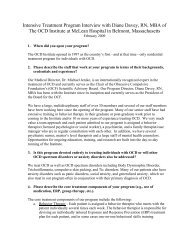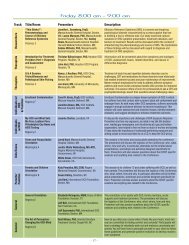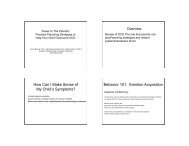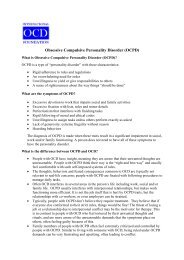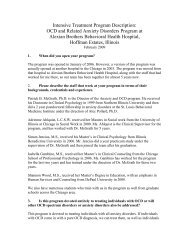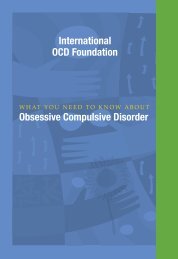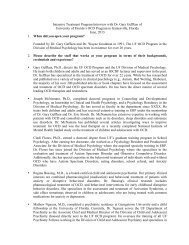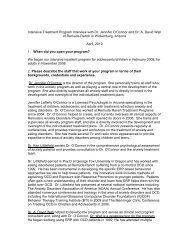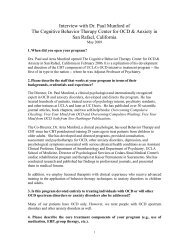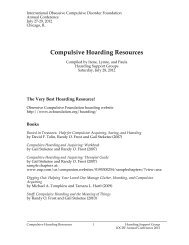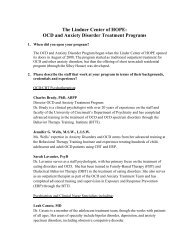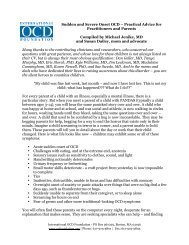Kansas City Center for Anxiety Treatment - Obsessive Compulsive ...
Kansas City Center for Anxiety Treatment - Obsessive Compulsive ...
Kansas City Center for Anxiety Treatment - Obsessive Compulsive ...
Create successful ePaper yourself
Turn your PDF publications into a flip-book with our unique Google optimized e-Paper software.
<strong>Kansas</strong> <strong>City</strong> <strong>Center</strong> <strong>for</strong> <strong>Anxiety</strong> <strong>Treatment</strong> (KCCAT)<br />
1. KCCAT opened by Dr. Lisa Hale in October 2005 to provide the local region with<br />
options <strong>for</strong> empirically based, cognitive-behavioral treatment of anxiety disorders. The<br />
center was developed working with Dr. Cary Savage as an affiliate with the <strong>Anxiety</strong><br />
Research Program at Hoglund Brain Imaging <strong>Center</strong> at the University of <strong>Kansas</strong> Medical<br />
<strong>Center</strong>, where Dr. Hale remains on faculty.<br />
2. Professional staff include:<br />
Lisa R. Hale, Ph.D., KCCAT Founder and Director<br />
Dr. Hale received her Ph.D. in Clinical Psychology with a subspecialty in Health<br />
Psychology from Finch University of Health Sciences/The Chicago Medical<br />
School, a leading program in the research and treatment of anxiety disorders, and<br />
completed an APA accredited internship in Clinical and Health Psychology at<br />
Charleston Area Medical <strong>Center</strong>/West Virginia University School of Medicine.<br />
She has extensive research and clinical training in cognitive-behavioral theories<br />
and treatments <strong>for</strong> anxiety across all age groups – early childhood to elderly<br />
populations – including intensive exposure/response prevention protocols <strong>for</strong><br />
severe anxiety disorders and experience training other professionals in these<br />
techniques. Dr. Hale completed a postdoctoral fellowship at Hoglund Brain<br />
Imaging <strong>Center</strong>, University of <strong>Kansas</strong> Medical <strong>Center</strong>, funded in part by a T-32<br />
Training Grant from the National Institute of Health. She remains on faculty at<br />
HBIC/KUMC as a Research Assistant Professor in the Department of Neurology.<br />
Her scholarly interests and peer-reviewed publications have focused on the<br />
identification of cognitive risk factors <strong>for</strong> anxiety disorders. She is a professional<br />
member of several national organizations including the <strong>Anxiety</strong> Disorders<br />
Association, the <strong>Obsessive</strong> <strong>Compulsive</strong> Foundation and the Association <strong>for</strong><br />
Cognitive and Behavioral Therapies.<br />
Amy M. (Brown) Jacobsen, Ph.D., Staff Psychologist<br />
Dr. Jacobsen received her Ph.D. in Clinical Psychology from the University of<br />
Georgia, where she specialized in child psychology and in the study and treatment<br />
of anxiety disorders. She completed an APA accredited internship in Clinical<br />
Psychology at SUNY Upstate Medical University and an APA accredited<br />
postdoctoral fellowship in Clinical Child Psychology at Mayo Clinic. She has<br />
served as an Assistant Professor in the Mayo Clinic College of Medicine and<br />
currently holds appointment at HBIC/KUMC as a Research Assistant Professor in<br />
the Department of Neurology. She has extensive clinical training in cognitivebehavioral<br />
treatments <strong>for</strong> anxiety across all age groups, including intensive<br />
exposure/response prevention protocols <strong>for</strong> severe anxiety disorders. Dr. Jacobsen<br />
has published several research articles on childhood anxiety and presents at state<br />
and national organizations. Her research interests include the role of the family<br />
environment in anxiety disorders and the development of intervention programs<br />
<strong>for</strong> children and families affected by anxiety. She is a member of several national
organizations, including the Association <strong>for</strong> Cognitive and Behavioral Therapies<br />
and the <strong>Anxiety</strong> Disorders Association of America.<br />
Ashley J. Smith, Ph.D., Staff Psychologist<br />
Dr. Smith received her Ph.D. in Clinical Psychology from the University of<br />
Nebraska-Lincoln, with an emphasis in child/family psychology. Her research has<br />
focused predominantly on social anxiety/phobia in adolescents, with a secondary<br />
interest in treating the overlap between anxiety and eating disorder symptoms.<br />
She completed an APA accredited internship in Clinical Child and Pediatric<br />
Psychology at Children's Mercy Hospital. Prior to joining the KCCAT team in<br />
2009, Dr. Smith completed a supervised postdoctoral experience and served as a<br />
staff psychologist at the <strong>Anxiety</strong> Disorders Specialty Clinic at Omaha Children's<br />
Hospital. Dr. Smith has extensive training and experience in CBT <strong>for</strong> anxiety<br />
disorders across the life span, and provides clinical services <strong>for</strong> all ages. She is a<br />
member of and regularly presents at the national conferences of the Association<br />
<strong>for</strong> Behavioral and Cognitive Therapies and the <strong>Anxiety</strong> Disorders Association of<br />
America.<br />
Caroline Elder Danda, Ph.D., Staff Psychologist<br />
Dr. Danda received her Ph.D. in Clinical Psychology from the University of<br />
Florida Department of Clinical and Health Psychology, with an emphasis in<br />
pediatric and child psychology. She completed an APA accredited internship in<br />
clinical child psychology at Children's Mercy Hospital and a postdoctoral<br />
fellowship in the Department of Pediatrics at the University of <strong>Kansas</strong> Medical<br />
<strong>Center</strong>. Prior to joining KCCAT in 2006, she served as an Assistant Professor in<br />
the Divisions of Pediatric Gastroenterology and Behavioral Pediatrics. Dr. Danda<br />
has extensive training and experience in providing cognitive-behavioral<br />
treatments <strong>for</strong> anxiety, stress, and obsessive-compulsive disorder across age<br />
groups. She also has particular expertise in the assessment and treatment of<br />
functional gastrointestinal disorders in children and adolescence (e.g., abdominal<br />
pain and Irritable Bowel Syndrome) and collaborates with pediatric<br />
gastroenterologists in the area. Dr. Danda is a member of the Association <strong>for</strong><br />
Cognitive and Behavioral Therapies, <strong>Anxiety</strong> Disorders Association of America,<br />
and the Society of Pediatric Psychology.<br />
3. While a majority (approximately 65%) of the individuals receiving treatment at<br />
KCCAT have a diagnosis of OCD, our program provides treatment <strong>for</strong> OCD spectrum<br />
disorders (e.g., trichotillomania, hypochondriasis) and other anxiety disorders.<br />
4. Our center offers assessment and state-of-the-art cognitive behavioral treatments <strong>for</strong> all<br />
ages based on current research in the area of mood and anxiety disorders. Specializing in<br />
Exposure and Response/Ritual Prevention techniques (ERP), we offer individually<br />
tailored treatments <strong>for</strong> children and adults that include options <strong>for</strong> intensive therapy<br />
protocols and home- and community-based treatment. Our clinicians work directly with<br />
the patient and appropriate support persons (e.g., parents, spouse) to provide education on
the anxiety cycle and the importance of ERP. From the beginning of treatment, we<br />
establish to goal of making our patients “experts” on their symptoms and to “work our<br />
way out of a job,” so that the patient and their family have the ability to manage their<br />
condition using ERP and other anxiety management strategies (with continued<br />
consultation and booster sessions as necessary) to maintain their gains over time.<br />
5. Patients complete a no-cost phone screen (to ensure program fit or provide other<br />
referrals) and then participate in a full evaluation package to aid in the treatment planning<br />
process. The evaluation includes a clinical interview lasting 90-120 minutes, a team<br />
review of pertinent background in<strong>for</strong>mation (including prior treatment history, past<br />
records and initial contact with other current providers, if applicable), and administration<br />
of relevant standardized measures (e.g., Yale-Brown <strong>Obsessive</strong> <strong>Compulsive</strong> Scale, ADIS<br />
modules, etc.). In addition, patients complete a series of self-report questionnaires to<br />
further assess anxiety, mood, and associated symptoms (e.g., quality of life). Referrals <strong>for</strong><br />
medication evaluation and management are available as needed.<br />
6. Individuals with co-morbid conditions can participate in the program if the comorbid<br />
condition is well-managed, or if it is being treated elsewhere and is not deemed to<br />
interfere with the anxiety treatment. For instance, an individual with a comorbid<br />
substance use disorder can participate if their substance use is effectively managed and<br />
not interfering with the patient’s participation in our treatment. If a patient presents with a<br />
primary depressive disorder with suicidal tendencies in addition to their anxiety disorder,<br />
we would likely determine that their depressive symptoms warrant treatment be<strong>for</strong>e more<br />
focused anxiety treatment would be deemed appropriate, and would likely refer this<br />
patient to another therapist until the depressive symptoms were better managed. If a<br />
patient presents with less debilitating or secondary depression comorbid to their anxiety<br />
disorder, we will include cognitive-behavioral strategies in their treatment to address their<br />
depressive symptoms as a part of the treatment readiness process (e.g., cognitive<br />
restructuring, behavioral activation).<br />
7. We strongly encourage family members and other support individuals (e.g., teachers,<br />
school counselors) to participate in the patient’s treatment. For instance, parents usually<br />
are involved in children and adolescents’ sessions to ensure that parents understand how<br />
to assist their child during between-session ERP activities. They may start by observing<br />
the therapist but eventually direct the child’s ERP activities during (and between)<br />
sessions. Further, clinicians are commonly in communication with teachers about<br />
appropriate classroom strategies and at times are asked to participate more directly in the<br />
child’s sessions (e.g., incorporating a speech therapist in the treatment of some children<br />
with selective mutism).<br />
8. Intensive outpatient treatment is tailored to individual needs and involves up to daily<br />
sessions that usually last from 90-180 minutes face-to-face therapist time, with assigned<br />
homework exercises and scheduled email and voicemail check-ins to increase adherence.<br />
At times we may schedule multiple sessions in one day, with time between sessions <strong>for</strong><br />
the patient to complete self-directed ERP activities.
9. The flexibility of treatment at KCCAT is definitely an asset of the program. Through<br />
the evaluation process, we are able to tailor the program to the patient’s needs based on<br />
the severity of their symptoms, their proximity in traveling to the clinic, their ability to<br />
completed self-directed ERP activities, etc. We can offer a variety of options <strong>for</strong><br />
intensive treatments, such as three sessions per week, daily sessions, or weekend or 5-day<br />
intensive treatment (i.e., meeting 5 times in one weekend or 10 times over 5 days). While<br />
we provide estimates of the length of treatment at the beginning based on our assessment,<br />
we adjust the number and time-length of sessions up or down as needed to optimize<br />
patient progress in symptom reduction and independence. Sessions are simply billed by<br />
therapist’s direct time with the patient, prorated in 5-minute increments, to account <strong>for</strong><br />
this flexibility.<br />
10. We in<strong>for</strong>m patients that they will be expected to complete homework assignments<br />
between sessions. These may include ERP activities, cognitive restructuring exercises,<br />
relaxation and breath retraining strategies, and tracking/recording symptoms. We<br />
underscore that the most important work they will do is on their own, between sessions,<br />
consistent with our goal to help them become their own “therapist or behavioral<br />
scientist.” Our program provides gradated levels of support throughout treatment that<br />
improves adherence, such as systems <strong>for</strong> email and voicemail check-ins, self-and support<br />
system monitoring, and phone sessions or support coaching services as needed. If patients<br />
are not completing their homework, we discuss and address the barriers be<strong>for</strong>e continuing<br />
with treatment.<br />
11. For relapse prevention, we provide extensive psychoeducation on the importance of<br />
continued ERP and use of anxiety management strategies to maintain gains over time;<br />
discuss the difference between “lapse” and relapse; schedule a follow-up session one<br />
month after termination (when possible); and encourage “booster” sessions as needed.<br />
Reassessment packets also assist us in monitoring maintenance, and are completed at post<br />
treatment, 6 mth, and 12 mth intervals.<br />
12. Typically, our patients remain in contact with us through our post-assessments and<br />
follow up <strong>for</strong> booster sessions as needed. If a patient is assigned to another clinic <strong>for</strong><br />
follow up (e.g., due to distance from our clinic), we consult with their local treatment<br />
providers about their care.<br />
13. We offer many options <strong>for</strong> working with patients in creating af<strong>for</strong>dable service<br />
packages, including no-interest payment plans. When available, portions of treatment<br />
may be offered at significantly reduced rates with training therapists (advanced master's<br />
and doctoral students) working under the supervision of a licensed psychologist. We also<br />
offer a unique “support service” within the greater metropolitan area (at a very nominal<br />
fee, with no travel charges). This service is ideal <strong>for</strong> individuals who may lack<br />
appropriate social support <strong>for</strong> further ERP coaching between clinical sessions, or those<br />
who simply need help monitoring home-based assignments, maintaining hoarding<br />
protocols, etc. Payments to the clinic may be made by check, cash, or credit cards<br />
(mastercard, visa, discover). We hope to offer treatment scholarships in the future.
14. We commonly see individuals who do not live in the <strong>Kansas</strong> <strong>City</strong> area. A hotel near<br />
the clinic has offered a reduced rate <strong>for</strong> our patients, and we have worked with other<br />
lodging arrangements (e.g., the Ronald McDonald House) to support families traveling<br />
here <strong>for</strong> treatment.




